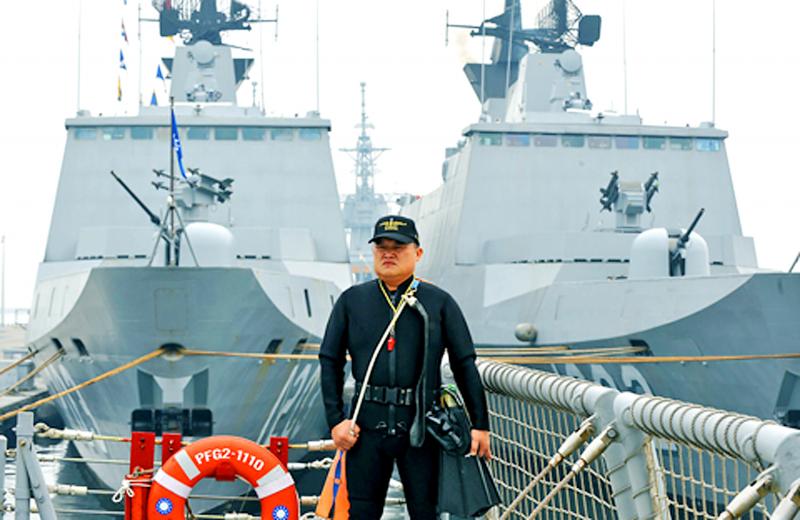Switzerland yesterday said that it would restitute to Taiwan nearly one-third of the US$900 million it confiscated over corruption allegations linked to a controversial French frigates sale to Taipei three decades ago.
“In the frigates case, Switzerland will restitute nearly US$266 million to Taiwan,” the Swiss Department of Justice and Police said in a statement.
The money, it said, “was illegal commissions” paid during a US$2.8 billion deal to buy six Lafayette-class frigates in 1991.

Photo: AFP
That deal, which strained French ties with China at the time, was later found to have been awash with hundreds of millions in bribes.
In 2001, Taiwan requested judicial assistance from Switzerland in the expansive corruption case, since much of the ill-gotten money was residing in Swiss bank accounts.
Switzerland had seized about US$900 million “as a preventive measure,” and in 2005 handed Taiwan numerous documents linked to the accounts.
Two years later, Switzerland restituted a first tranche of US$34 million to Taiwan.
Yesterday, the department said that a ruling by a Taiwanese court in late 2019, “confirming the illegal provenance of the funds and ordering their confiscation, opens the door to restitution” of another US$266 million.
However, Switzerland said that the ruling has not “proven that the other blocked funds resulted from corruption, and the sequestration affecting them will be lifted.”

The Central Election Commission has amended election and recall regulations to require elected office candidates to provide proof that they have no Chinese citizenship, a Cabinet report said. The commission on Oct. 29 last year revised the Measures for the Permission of Family-based Residence, Long-term Residence and Settlement of People from the Mainland Area in the Taiwan Area (大陸地區人民在台灣地區依親居留長期居留或定居許可辦法), the Executive Yuan said in a report it submitted to the legislature for review. The revision requires Chinese citizens applying for permanent residency to submit notarial documents showing that they have lost their Chinese household record and have renounced — or have never

A magnitude 5.6 earthquake struck off the coast of Yilan County at 12:37pm today, with clear shaking felt across much of northern Taiwan. There were no immediate reports of damage. The epicenter of the quake was 16.9km east-southeast of Yilan County Hall offshore at a depth of 66.8km, Central Weather Administration (CWA) data showed. The maximum intensity registered at a 4 in Yilan County’s Nanao Township (南澳) on Taiwan’s seven-tier scale. Other parts of Yilan, as well as certain areas of Hualien County, Taipei, New Taipei City, Taoyuan, Hsinchu County, Taichung and Miaoli County, recorded intensities of 3. Residents of Yilan County and Taipei received

Taiwan has secured another breakthrough in fruit exports, with jujubes, dragon fruit and lychees approved for shipment to the EU, the Ministry of Agriculture said yesterday. The Animal and Plant Health Inspection Agency on Thursday received formal notification of the approval from the EU, the ministry said, adding that the decision was expected to expand Taiwanese fruit producers’ access to high-end European markets. Taiwan exported 126 tonnes of lychees last year, valued at US$1.48 million, with Japan accounting for 102 tonnes. Other export destinations included New Zealand, Hong Kong, the US and Australia, ministry data showed. Jujube exports totaled 103 tonnes, valued at

BIG SPENDERS: Foreign investors bought the most Taiwan equities since 2005, signaling confidence that an AI boom would continue to benefit chipmakers Taiwan Semiconductor Manufacturing Co’s (TSMC, 台積電) market capitalization swelled to US$2 trillion for the first time following a 4.25 percent rally in its American depositary receipts (ADR) overnight, putting the world’s biggest contract chipmaker sixth on the list of the world’s biggest companies by market capitalization, just behind Amazon.com Inc. The site CompaniesMarketcap.com ranked TSMC ahead of Saudi Aramco and Meta Platforms Inc. The Taiwanese company’s ADRs on Tuesday surged to US$385.75 on the New York Stock Exchange, as strong demand for artificial intelligence (AI) applications led to chip supply constraints and boost revenue growth to record-breaking levels. Each TSMC ADR represents